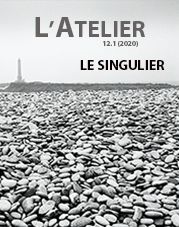Wodwo, or the Wanderer: to risk being and to risk language
Abstract
In Wodwo, Ted Hughes condemns the men of the modern age who thought that they were at the centre and the top of a world created for them, who exploited and destroyed everything. The poet depicts doomed souls and spectral figures haunted by shadows that have become more powerful and consistent than them. The motif of the katabasis, which is central in Hughes’s collection, sheds light on a necessary conversion of all values. As he turns around, not to take a narcissistic look at himself but, like Orpheus, to meet Eurydice's eyes, the human subject faces the ‘presence of his infinite absence’ and discovers what makes him truly singular. Ted Hughes’s poetic vision and the poetry of Maurice Blanchot’s ideas seem to coincide on this point: the experience of death is the core of the poetic work and its infiniteness, which is the infiniteness of being and of the poetic word itself. Wodwo, a wild, half-human, half-animal creature, is the ‘wanderer, the one always astray,’ who ‘risks’ being and language. When Wodwo speaks, he utters words that are foreign and unstable, words that take man’s singularity and individuality back to an invisible reflection, an intimate but unknowable otherness. Wodwo and his language are one with the natural world: in them rises the inaudible music which resonates when the wind rustles but whose ‘meaning will not part from the rock.’ This is the truth of the wanderer and of the total rhythm of the natural world: in the ‘tension of an infinite beginning,’ they pave the way for the renewal of being and language.
Published
Issue
Section
License
- Work submitted for publication must be original, previously unpublished, and not under consideration for publication elsewhere. If previously published figures, tables, or parts of text are to be included, the copyright-holder's permission must have been obtained prior to submission.
- Authors of accepted manuscripts will assign to L'Atelier the right to electronically distribute their article, or publish it in any form (Internet, CD ROM, printed copy) but authors will retain copyright and, after the article has appeared in L'Atelier, authors may republish their text (in print and/or electronic form) as long as they clearly acknowledge L'Atelier as the original publisher.


